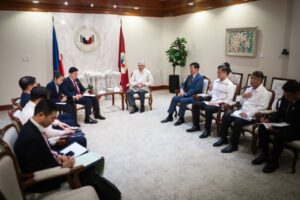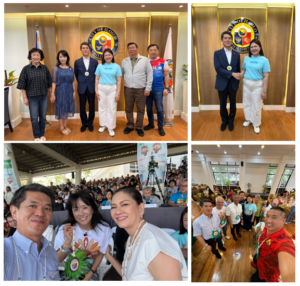The Philippine government reaffirmed its commitment to a stronger and more enduring bilateral economic cooperation with Japan as it continues to advance infrastructure development in the country.
The pledge was made during the 15th Meeting of the Philippines-Japan High-Level Joint Committee on Infrastructure Development and Economic Cooperation held on March 24 at the Bureau of the Treasury office.
Co-chaired by the National Economic and Development Authority (NEDA) and the Department of Finance for the Philippine Government, and Special Advisor to the Prime Minister for the Japanese Government, the meeting focused on opportunities to strengthen multi-sectoral cooperation in areas such as disaster risk reduction, maritime safety, regional development, information and communications technology, and energy and environment. Projects supporting the Mindanao Peace Process were also discussed during the meeting.
NEDA Secretary Arsenio M. Balisacan emphasized the pivotal role of infrastructure development in strengthening the Philippine economy and improving the quality of life of Filipinos, citing the partnership with Japan as a factor in the country’s sustained and transformative growth.
“Today’s discussions reaffirmed our shared commitment toward ensuring the successful implementation of key infrastructure projects and tackling challenges in project execution. We have taken stock of our accomplishments, exchanged updates on critical initiatives, and explored new avenues for cooperation,” he said.
The meeting also reviewed the progress of several infrastructure projects supported by the Japanese government that are currently in the pipeline. These include the Parañaque Spillway Construction Project, Philippine Coast Guard Support Facility, National Digital Terrestrial Television Broadcasting Network Project, and the Second San Juanico Bridge Construction Project.
Balisacan emphasized the need to sustain these investments, implement policy reforms, strengthen institutions, and recognize the importance of innovative financing solutions as the Philippines progresses toward achieving upper middle-income country status.
“Our discussions also underscored the importance of innovative financing solutions. With concessional loans becoming less accessible, we recognize that Public-Private Partnerships will play a greater role in infrastructure development. We look forward to expanding our cooperation in this area and leveraging Japan’s expertise to enhance private sector engagement for priority projects,” he added.
The meeting also saw the ceremonial signing of the loan agreements for the following projects: the Davao City Bypass Construction Project; Phase IV of the Pasig-Marikina River Channel Improvement Project; Cavite Industrial Area Flood Risk Management Project; Climate Change Action Program, Subprogram 2; and the Build Universal Healthcare Program, Subprogram 2.
The Joint Committee on Infrastructure Development and Economic Cooperation was established in January 2017 after the state visit of then-Prime Minister Shinzo Abe to the Philippines. It aims to facilitate the monitoring of ongoing infrastructure and economic cooperation projects in the Philippines, as well as to address issues and challenges encountered during project implementation.


